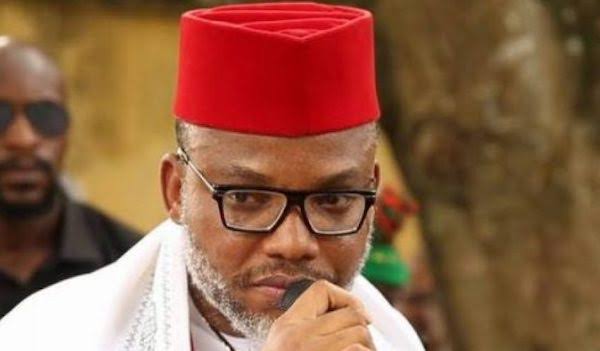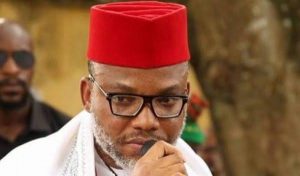
UPDATE: SUPREME COURT INSISTS NNAMDI KANU MUST FACE TRIAL, OVERTURN APPEAL COURT JUDGEMENT
The Supreme Court ruled that Kanu must stand trial before the Federal High Court, sustaining the government’s appeal.
In a decision written by Justice Garba Lawal but delivered by Justice Emmanuel Agim, the Supreme Court ruled that the Court of Appeal erred in holding that Kanu could not face retrial due to the illegal actions committed against him by the Federal Government after their invasion of his home.
Additionally, the Court decided that, although Kanu was forcibly removed from Kenya by the Nigerian government due to recklessness, this illegal action did not prevent any court from moving forward with a trial.

According to Justice Lawal, no Nigerian law was mentioned in the lawsuit requesting Kanu’s release on the grounds of his kidnapping without authorization from Kenya.
Instead of removing the courts’ ability to proceed with Kanu’s trial for claimed criminal charges, the Court claims that the current remedy for such an action is for Kanu to bring a civil suit against the conduct.
Kanu did not appear in court for the ruling, which is the most recent stage in a protracted legal battle.
The ruling on Friday was handed down under heavy security in response to appeals for Kanu’s release made by Ohanaeze and a few others.
Kanu, the head of the Indigenous People of Biafra (IPOB), a banned secessionist organisation, has been detained since his re-arrest in Kenya in June 2021 and subsequent return to Nigeria.
He has accused the Federal Government, together with his legal team, of kidnapping him and bringing him into Nigeria unlawfully. In court, he has contested the purported extraordinary rendition.
He was charged with four felonies, including treason, conspiracy to commit treason, terrorism, illegal importation of radio equipment, and slander of former President Muhammadu Buhari, after his re-arrest in 2021. He was initially arraigned before the Federal High Court in Abuja.
Afterwards, the charges were changed to 15 and included membership in a prohibited organisation and acts of terrorism.
Eight of the fifteen accusations were dismissed by trial court judge Binta Nyako, who stated that Mr. Kanu needed to respond to concerns about the remaining seven charges.
Mr. Kanu filed an appeal with the Court of Appeal after being dissatisfied with the decision; the Court of Appeal dropped the remaining charges and granted Mr. Kanu’s freedom.
The Federal Government informed the court that it would be appealing to the Supreme Court, which led to a surprising development: the court then issued a stay of implementation of its judgement.
![]()
